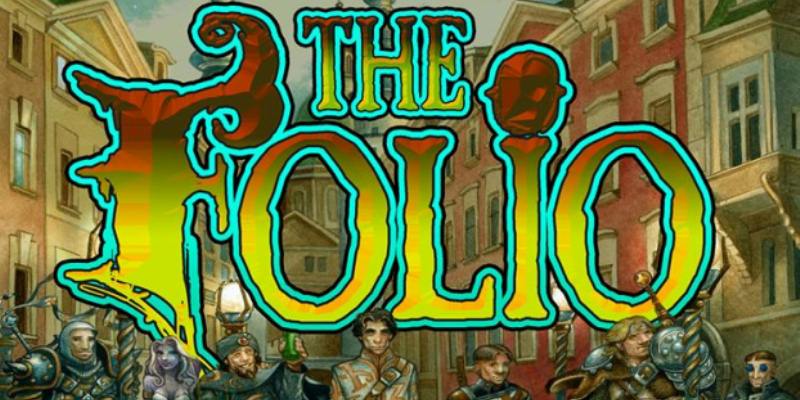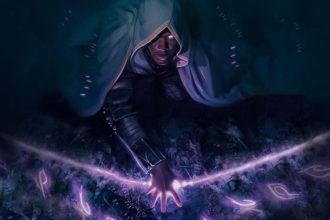Interview from the Shed – Adventures from the Shed Podcast
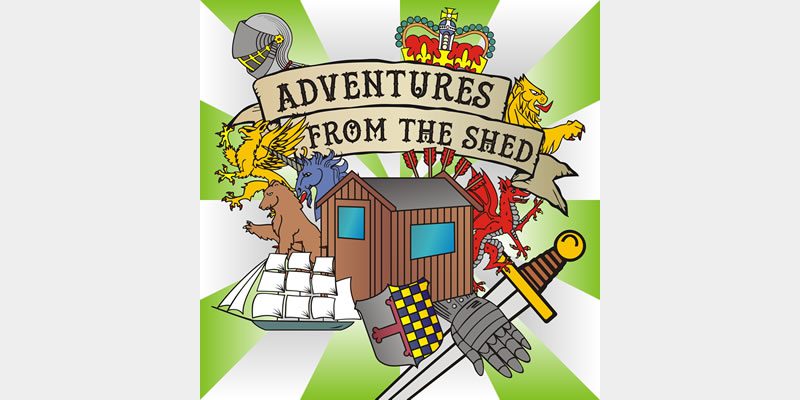
At Tribality, we’ve been interviewing some of the people who are behind all the awesome stuff that is being created for tabletop gamers – such as podcasts. I started listening to the Adventures From the Shed podcast last year. I am really excited to bring you an interview with Joe and the rest of the crew from “the Shed”. I was lucky enough to ask Joe and the rest of the cast a ton of questions. I hope you enjoy this interview and please check out their podcast if you like D&D, Dungeon World and rich storytelling.
Before we talk about gaming and your podcast, can you tell us a little bit about yourself?
JOE: Sure! I share my life with a wonderful wife and two beautiful girls. We’ve lived in the Upstate of South Carolina for about 8 years after moving here from MA.
I’m an IT guy in my current professional life, and I’ve worked many different fields; from manufacturing to foodservice to retail to warehousing. I’ve also traveled a fair bit. I like to think meeting and working with different people around the world has a positive impact on my life in general, and my approach to gaming.
How did you first get into tabletop RPGs?
JOE: Somewhere between 4th and 6th grades is where my first RPG memories reside. I remember sitting at a small table with a couple classmates playing Dungeons and Dragons. I played the fighter in the old box set and recall only a little about the adventures we went on while in elementary school. What sticks in my mind most, for whatever odd reason, was how neat it was to take the little white crayon and fill in the numbers on the dice from the set!
I then went on to play several games through about age 18. If memory serves me, during these years I played AD&D, Twilight 2000, Robotech, Palladium RPG, Marvel Superheroes, and a bunch of board games and tactical games, like Battletech, Car Wars, Titan, and others.
Then there was a gap of a bunch of years where I mainly read about games and watched movies fitting the fantasy genre, all the while thinking about how I wanted to play. Somewhere around 4 years ago, my wife and I noticed a hobby/game store on our drive home. I stopped in and learned about D&D Encounters, and have been back into tabletop RPGs since!
Why did you decide to start recording your game sessions and publish a podcast?
JOE: I had listened to a few non-RPG podcasts in the past, so I was aware of what a podcast actually is – You might be surprised at how many people still think you need a iPod to play a podcast – so I knew right where to go when someone at the RPG table recommended the podcast Critical Hit. I had been reading a few columns here and there, but hadn’t put much thought into podcasts as a form of RPG research and entertainment. After listening to a few different podcasts, I formulated the idea to create a tabletop RPG podcast focused on entertaining and good quality audio. My target audience really started as myself; someone who might want to listen in the car on the drive to work, and may have some time during the day where it’s easier to listen to something entertaining rather than read. I’d had musical jam sessions with friends for years, so I already had much of the audio equipment on hand. The concept for Adventures From The Shed was born mid-2014, and has been growing gradually since.
For your main campaign you have jumped around a bit from D&D 5th edition to Dungeon World. Why did you feel that Dungeon World would work better for a podcast?
JOE: As you mentioned, our longest running games have been a mix of D&D and Dungeon World. Let me also mention that we’ve played Edara: A Steampunk Renaissance, Pathfinder Beginner Box, Star Wars – Age of Rebellion box, Tavern Tales, and the homebrew “thing” I made for our 2015 Halloween Special. I’ll also mention that I feel our podcast works best when we switch things up after 15 to 20 episodes of one system or story, and you can see that split when you read through our feed or listen in sequence.
As far as your actual question, when it comes to an audio podcast, like Adventures From The Shed, my take is that it works best when there’s about 25% game system talk and 75% character/player interaction. D&D 5e, specifically the Starter Set and levels 1-5 fit that model perfectly, due to the limited abilities of the characters and overall small bucket of modifiers and rules to keep track of. As D&D progresses in levels, it takes longer and longer for people to review what their characters can do and which rules apply to which situations.
Dungeon World has all the rules players need on two pieces of paper. There’s the Moves sheet, and the Character sheet. Clerics and Wizards also have a spell sheet. There are only 6 modifiers to pay attention to; 1 for each ability. This doesn’t change from level 1 through 10. Having such little reliance on looking up rules and situational modifiers really allows us to spend more time with character and player interaction, which is where the vast majority of audio entertainment comes from.
Any system which reduces the amount of rules in favor of story and interaction is part of my recipe for a great audio podcast. I am a firm believer that without rules, we aren’t playing a game; we are just sitting around a campfire making up crazy stories. Rules are imperative, and some face-to-face games can flourish in rules-heavy systems…I just find them to be tedious in an audio-only format.
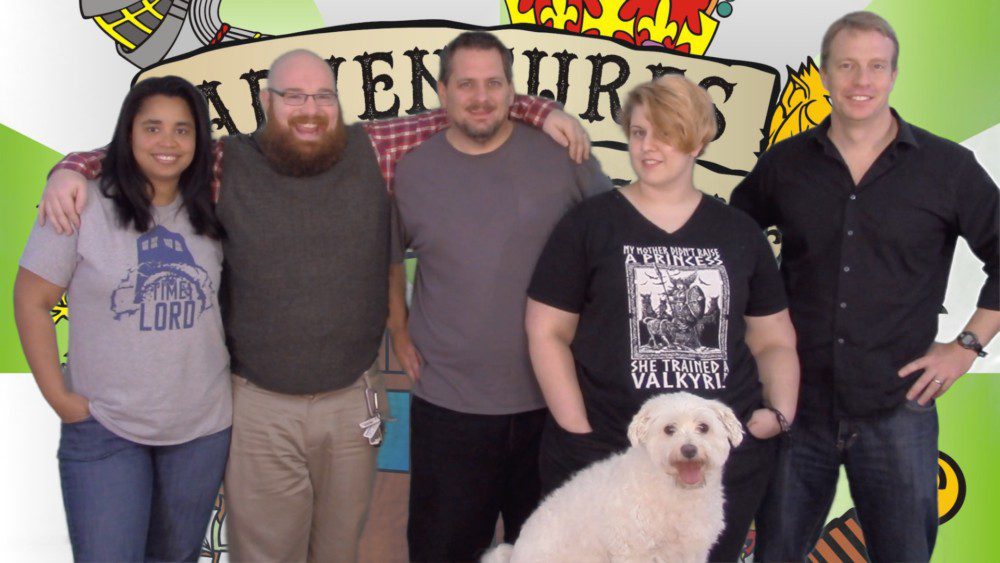
What’s up next for you and the group?
JOE: The current AFTS cast is moving on to a D&D campaign next, with JJ in the DM’s chair. We’re going to take our shot at making Curse of Strahd an entertaining audio podcast!
In addition to that, I will soon be releasing a YouTube series for RPG advice. I’m hoping the format and presentation I’ve chosen will be a new take on an old tradition of RPG advice columns and videos, as I take questions both directly and from various online sources, and answer them in short 2 to 4-minute videos. I expect the first of these to air sometime in June 2016 on the Adventures From The Shed YouTube channel.
Lastly, I’ve been experimenting with a 360* camera to let our audience not only experience the audio of sitting at our gaming table in The Shed, but to also be able to control the camera while watching us from the same perspective! There is a teaser of this already on our YouTube channel where you can watch JJ, Kurt, and myself play a short D&D adventure. You can use your mouse to move the camera, or just tilt and turn your phone/tablet!
Can you give me a quick pitch for why I should listen to your podcast (if I wasn’t already)?
JOE: At Adventures From The Shed we care about your ears 🙂
Our primary goal is to make an entertaining audio podcast where we talk about and play tabletop RPGs. We do our best to make sure you can hear every voice clearly, so you can experience the game with us. We keep cross-talk, multiple conversations, and interruptions to a minimum so you don’t get lost in the shuffle of folks talking over each other.
Of course we play games and have fun doing it – so if you want that great tabletop RPG entertainment in a podcast where you can actually hear what’s going on, Adventures From The Shed is ready for you to subscribe!
What makes your setting of Alamand special?
JOE: Just like most of my game worlds, Alamand was created as a skeleton of information and filled in by both myself and the AFTS Cast as we played. What makes it special is that everyone ends up with a vested interest in the world because they have equal hands in the creation.
Some examples of this:
- The mighty Empire of Amarash was created by JJ as part of his character’s backstory. Also, Casalee (Medusa and Medusa 2.0) came from his backstory
- The secret grove of the ancient fae oracle (druid) was a combination of Mickie’s backstory for Nesolis and Kurt’s for Truk; part of her childhood protection happened at the hands of the fae oracle and Truk needed to learn druid stuff from a member of the wildwalkers. Making a connection like this in character backstories helps the players feel a link they didn’t know existed.
- The Temple of The Order of Light is directly from Britanny’s history with Aleyna.
It’s these bonds we create with the setting that make it special. If I make it all up on my own, they’re just playing in MY world rather than all of us playing in OUR world.
Is “The Shed” actually a shed?
JOE: Why, yes it is! I’ll attach a picture.
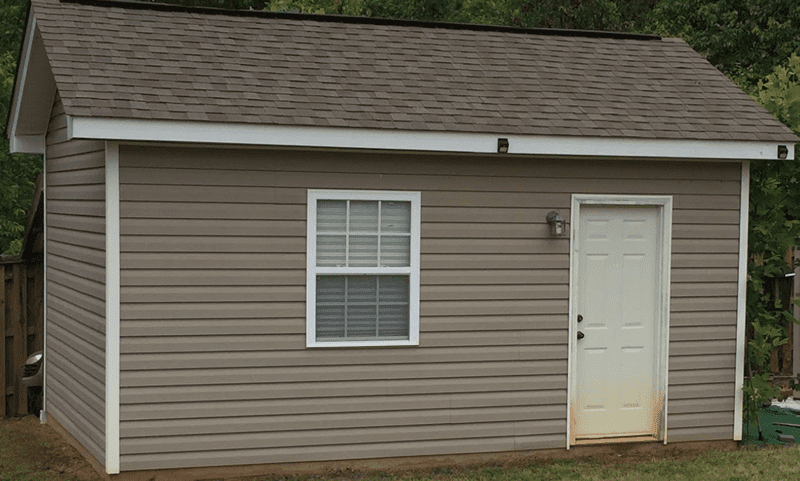
Do you prefer being a gamemaster (GM) or a player?
Joe: I prefer to be a GM for the level of interaction at the table. As GM, it’s necessary to be involved no matter whose “turn” it is. Being involved doesn’t have to mean talking or interjecting, however – sometimes listening intently is essential to being involved. It’s a balancing act I enjoy.
Britanny: Being a pretty casual player myself, I prefer the role of player. I wouldn’t mind GMing a one-shot or even a pre-made campaign if I had that much time on my hands. In the meantime, I’m content with being a player in the games other people have come up with and maybe casually helping out coming up with ideas for other games.
JJ: I prefer to maintain a balance, to much of either and you can lose sight of the other position.
Kurt: While I play more than I GM, I think I prefer leading the game. When I am the GM, I feel actively involved in every minute of the session, and even when we are not playing, I find myself planning and thinking about the next game. As a result, gaming becomes a more significant part of my life than when I am just playing. Having said that, I find benefit in both playing and GMing; I think all GMs should play so that they can see the screen from the other side.
Mickie: I prefer being a player, all the way. I enjoy the story aspect of role playing, but don’t want the stress of creating it.
When did you first take on the challenge of being a GM? How did it go?
Joe: My first actual experiences as GM involve younger times I don’t remember good enough to answer this question. That said, in more recent years I picked up as GM in a D&D Encounters session as my first time running a public game. That was a harrowing experience with anywhere from 5 to 9 players at the table any given week. It was a blast to run and, thanks to the prepared materials, it wasn’t too difficult to keep the adventure going. Running a game for 9 players is something I am glad to have done once, but am not eager to try again!
Britanny: Just have fun with it. Really – play with people that you’re comfortable with who don’t tell you what to do. It’s your character, do what you want with it (within reason.)
JJ: I DM’d the 3.5 module “The Red Hand of Doom.” Either the module is amazing, or I am, as my players wanted to keep going after.
Kurt: I led games in grade school (back in the 1980s), and then tried again when my kids wanted to play the Pathfinder Beginner Box. I’m now teaching Dungeon World to my kids and their friends. I should probably find an adult game soon . . .
Do you have any advice for first time GMs?
Joe: Invariably, the biggest concern I hear from people who want to try their hand as a Game Master is preparation. Most folks I talk to about it are under the impression they must know most, if not all of the rules, be prepared with every location and NPC, and have a clear adventure path in mind to account for any deviation the players may take. In my experience, this is untrue for the majority of GMs. In regards to rules, you are sure to have at least one expert at the table who is more than happy to help with the rules. If you don’t, that just means everyone learns together and has equal footing as you go! You just need to know the basic structure for two things in the system you’re playing; 1 – what is the structure for combat, and 2 – what is the structure for everything else (social interaction, exploration). In some games, the two are the same, making it even easier! For NPCs and locations, you don’t need the names of every place in the world – you just need the places where the PCs are now, and sometimes a place they want to go. For example, if you really want to create taverns ahead of time, you don’t need to create a tavern for every city on the globe; just create a few taverns and set them aside for when the characters want to visit one. Now that one you just picked becomes the tavern in this town.
JJ: Yes, just go for it. You aren’t a trained monkey for the enjoyment of your players, you are the facilitator of an interactive story for all to enjoy.
Kurt: Be enthusiastic, positive, and patient.
Do not expect to know what your players will do or where they will go.
Preparation should allow you to be flexible rather than tying you to a set a specific events or encounters.
Mickie: Don’t be a bitch, and don’t get mad at your players for not following your adventure exactly as you prepared it.
You’ve given lots of advice in your Sidebar podcasts. What are some topics you would like to cover in the future/favorite topics you covered?
Joe: I’m working with one or two concepts for a different style of sidebar, so that’s likely to happen (teaser). In the meantime, we’ve talked more than once about wanting to elaborate on some things we’ve said in the past, so I’m expecting we’ll have a Sidebar Recap, of sorts, where we re-visit what we’ve said in the past and see what we would add today.
JJ: Favorite topic has to be the gaming with the opposite sex/couples one. I was able to share so much insight that I didn’t even know I had. A podcast I would like to cover in the future is one where we would discuss losing a player and interviewing/finding a new one.
Mickie: I’d like to talk about cosplay and larping, maybe one day we can do adventures from Joe’s back yard.
Do you have any advice for first time players?
Joe: I’m going to go a little off the beaten path here, since just about every advice for first time players involves not worrying, having fun, and finding a group. I’d like to offer the following: be respectful of others at the table. We’re all there for the same purpose, even if each of us has different ways of showing it. You may be shy, but be respectful of the effort others are putting in to communicate and acknowledge them accordingly. You may be one who talks a LOT, but make sure you’re giving prompts to the quiet ones so they have opportunities to jump in. You may make jokes at every turn, but be respectful of those who may want a less humorous session and leave plenty of room for serious interaction. There’s that old saying that respect is earned, but whether it’s earned or not, it still has to be given…be a giver!
JJ: Whether you like to roleplay or roll-play, just enjoy yourself at the table.
Kurt: Don’t stress about the rules. Someone, or everyone, at the table will help you. Make a character you are drawn towards emotionally. Don’t worry too much about the stats, or whether the character can deal maximum damage.
Mickie: Relax, there are no wrong answers. Well, that’s a lie. The only wrong answer is the one that causes you to not enjoy the game.
What was your favorite session/episode of the show and why?
Joe: My favorites stem from moments rather than specific episodes, so I can’t name specific episodes to listen to. The best times in the podcast, for me, come from when the player makes a clear connection with the character and it shows in the way the character begins to develop thereafter. A few I remember vividly; Mickie and Bree – During the D&D Starter Set there was a confrontation with some bandits…I still use the phrase “Shoot ‘em in the knee!”. JJ and Strongdawn – In the Perils of Parandisi Dungeon World campaign, Strongdawn developed a fondness for incense that caused several fun moments, including him thinking he had a god inside of him.
There are also the moments where I feel like I picked the perfect thing to happen in the environment so that it complements the characters in a way that makes both sides appreciate it. When the sapling from the druid in the corner became Truk’s friend and later was planted in the grove, then offered its first branch to Truk as a sign of friendship. Those connections are my “favorite episodes”.
Britanny: The Christmas episodes are probably my favorite. A lot of effort and hard work went into making those (on the GM’s side, at least), and I loved the end result and all of the little puzzles, among the story line itself.
JJ: I have 2. The first being when we were running the D&D starter set and I counselled Bree that her shoot first-ask questions later approach to life was a bit extreme. Then the gentleman who I let escape came back to bite me and Ferrous was enraged, cast his cantrip, and criticalled. I do so love when the dice back up the players actions. The second was the look of surprise on Joe’s face when Strongdawn charged through Hisara’s gate to her realm in order to do battle with her.
Kurt: I loved playing the D&D 5e starter set. That was a great adventure, and the new rules system was a joy to learn.
Mickie: No single session comes to mind, but I do know that I enjoy when we role play so hard that I forget I’m Mickie.
What is your favorite tabletop RPG to run right now for longer campaign?
Joe: I remain a Dungeon World fan for the audio podcast format. I’m still open to other systems, and I expect to be trying at least one GUMSHOE game as an option. Outside of the podcast format, I really like the core of D&D 5e and I’m hoping to play a longer campaign in that system. I’d also like to try 13th age at some point.
Britanny: As a player, Dungeon World is probably my current favorite – I don’t play often enough to remember a long set of rules so it is easier to remember the basics and there is more freedom as far as what a character can and cannot do within that rule set.
JJ: Nothing beats the feeling of advancement like you get from D&D. Each level feels impactful in some manner.
Kurt: D&D 5e.
What is your favorite tabletop RPG to run right now for a shorter campaign or one-shot?
Joe: Now that I’ve played several beginner box/starter box games, I think those are ideal for one-shots in that they have everything you need in one box and are typically very affordable. Aside from that, I’d go to Dungeon World again. Character creation in minutes and gaming with little effort makes for an easy one-shot.
Britanny: As a player, my favorite one shot games are probably the D&D board games. Castle Ravenloft or Wrath of Ashardalon, off the top of my head, are ones that I remember liking when I tried them out.
JJ: Dungeon World is where it’s at for a shorter or story focused campaign.
Kurt: Dungeon World
If someone is looking to branch out from D&D/Pathfinder and try a new game for their table, do you have any recommendations?
Joe: Do I need to say “Dungeon World”? HA! I’d also recommend reading up on ANY system that is not d20 so you can get a flavor of what the rest of the tabletop RPG world has to offer.
Britanny: The aforementioned Dungeon World is good as far as an easy transition, or even for new players to get them more interested in gaming in general.
JJ: Both the Star Wars set and the fate system are tons of fun.
Kurt: While I don’t have direct experience with these yet, 13th Age and Nights’ Black Agents really appeal to me. I would also love to try Star Wars: Edge of Empire or Star Wars: Force and Destiny.
Mickie: Edara, for sure.
While at the table your group doesn’t stray from using profanity, talking about sex and other stuff that isn’t exactly family friendly. Did you ever have a discussion about censoring yourselves or did you just record the game how you wanted to play it?
Joe: When I first went recruiting for the AFTS Cast, it was imperative that I find people who could be entertaining without forcing something for the podcast. In combination, I stressed that we are a group of adults playing a social game. Language and alcohol are allowed, and everyone is welcome to explore either while being conscious of their personal limits. Lastly, those who have worked with audio and editing for content can tell you how time-consuming it is to edit and still retain good quality. While I may spend about 30 minutes of post production on each episode as is, it could easily be hours if it were to be “cleaned up” for language.
You can, however, find a completely family-friendly series with our Pathfinder Beginner Box Episodes, which Kurt GM’ed for AFTS. It’s in our feed and is NOT explicit. I also expect more non-explicit content on our YouTube channel in 2016.
If folks want more family-friendly content, we can definitely make the effort! Send us an email and let us know!
Interesting bit of trivia for those who like this stuff – with more than 100 episodes published, there is a single one where I edited for language. Bonus points for whomever can name that episode!
Anything else you would like to add before I let you get back to recording?
Joe: I really appreciate the opportunity to chat with you and your readers at Tribality.com! I hope reading more about Adventures From the Shed helps people understand who we are and why they should listen to us!
Our podcast has always been, and shall remain, free to all who want to hear us. Of course there are real-world costs involved in making it all happen, and I’ve finally decided to sign up at Patreon and invite people to support us if they choose. There is a simple $1 option as well as a $10 option, which lets the patron name something for the podcast, like a town, NPC, or item. I also plan to have other exclusive rewards for patrons in the coming months.
Also, there are video counterparts to a few audio episodes, plus some fun stuff that isn’t in the podcast feed. Check out
https://www.youtube.com/channel/UC3Ho9Eb67JM75IN4WodhfqA
JJ: Remember kids, knowledge can put out forest fires…or something.
Mickie: Thanks for reaching out to us.
Shawn: Thanks everyone for the excellent answers. I can’t wait for the next episode. Everyone, please be sure to check out Adventures From the Shed.

